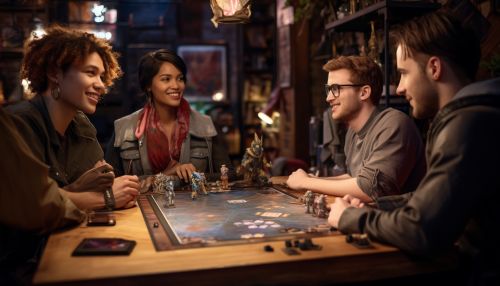Roleplay
Introduction
Roleplay, also known as role-playing, is an activity in which participants adopt and act out roles of characters or behaviors that are different from their own. This practice is used in a variety of contexts, including entertainment, education, and therapy. Roleplay can take many forms, from traditional tabletop games like D&D to online virtual worlds such as Second Life. It allows individuals to explore different perspectives, develop empathy, and engage in imaginative play.


History
Roleplay has a rich and diverse history, with roots in ancient storytelling and ritual practices. The modern concept of roleplay, however, can be traced back to the development of psychodrama in the early 20th century. Psychodrama is a form of therapy that uses guided drama and role-playing to work through personal and social problems. This therapeutic approach laid the groundwork for the use of roleplay in other contexts, including education and entertainment.
Roleplay in Entertainment
In the realm of entertainment, roleplay is most commonly associated with role-playing games (RPGs). These games, which can be either tabletop or digital, involve players assuming the roles of characters in a fictional setting. Players make decisions for their characters based on their understanding of the characters' personalities and the situations they find themselves in.
Tabletop Role-Playing Games
Tabletop RPGs, such as D&D, are typically played with a group of people in person. One player, known as the Game Master (GM), creates the game world and guides the story, while the other players control individual characters within that world. The outcomes of the characters' actions are usually determined by a system of rules and dice rolls.
Digital Role-Playing Games
Digital RPGs, on the other hand, are played on computers or gaming consoles. These games can be single-player, where one player controls a character in a pre-designed world, or multiplayer, where multiple players interact in a shared virtual environment. Examples of digital RPGs include the Final Fantasy series and World of Warcraft.
Roleplay in Education
Roleplay is also used as an educational tool, allowing students to explore complex concepts and situations in a safe and controlled environment. This can include historical reenactments, mock trials, and simulations of business scenarios. Roleplay in education can help students develop critical thinking and problem-solving skills, as well as empathy and understanding for different perspectives.
Roleplay in Therapy
In therapeutic settings, roleplay is used as a way for individuals to explore personal issues and develop new ways of thinking and behaving. This can involve acting out past experiences, future worries, or hypothetical situations. Roleplay in therapy can be particularly effective in helping individuals develop social skills, manage anxiety, and work through traumatic experiences.
Conclusion
Roleplay is a versatile and powerful tool, used in a variety of contexts to entertain, educate, and heal. Whether it's adventuring in a fantasy world, stepping into the shoes of a historical figure, or working through personal issues, roleplay allows individuals to explore different perspectives and engage in imaginative play.
